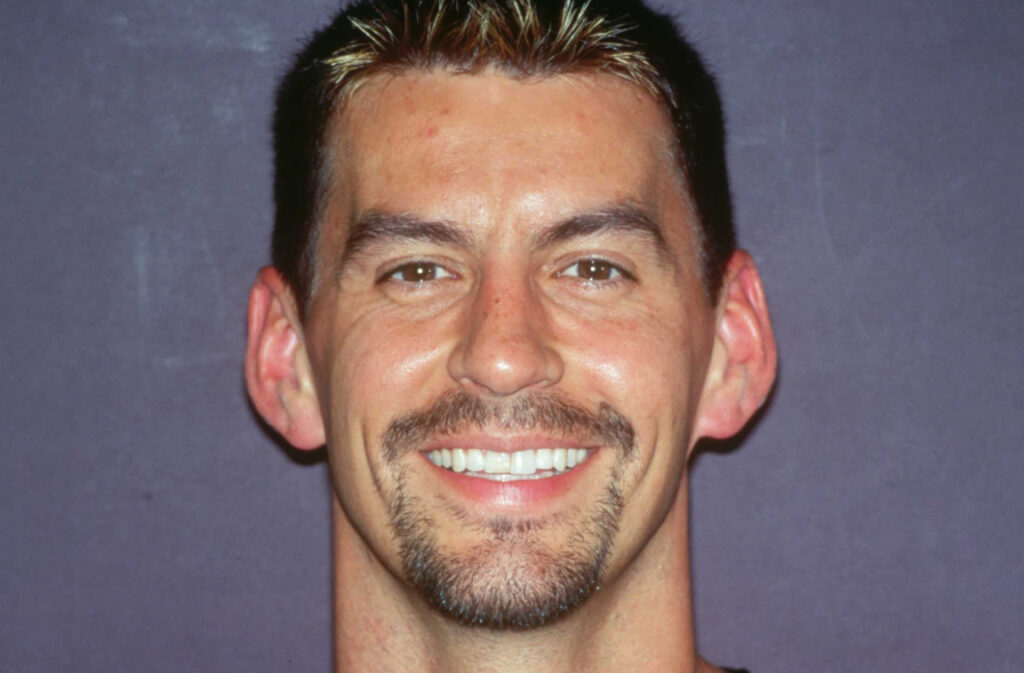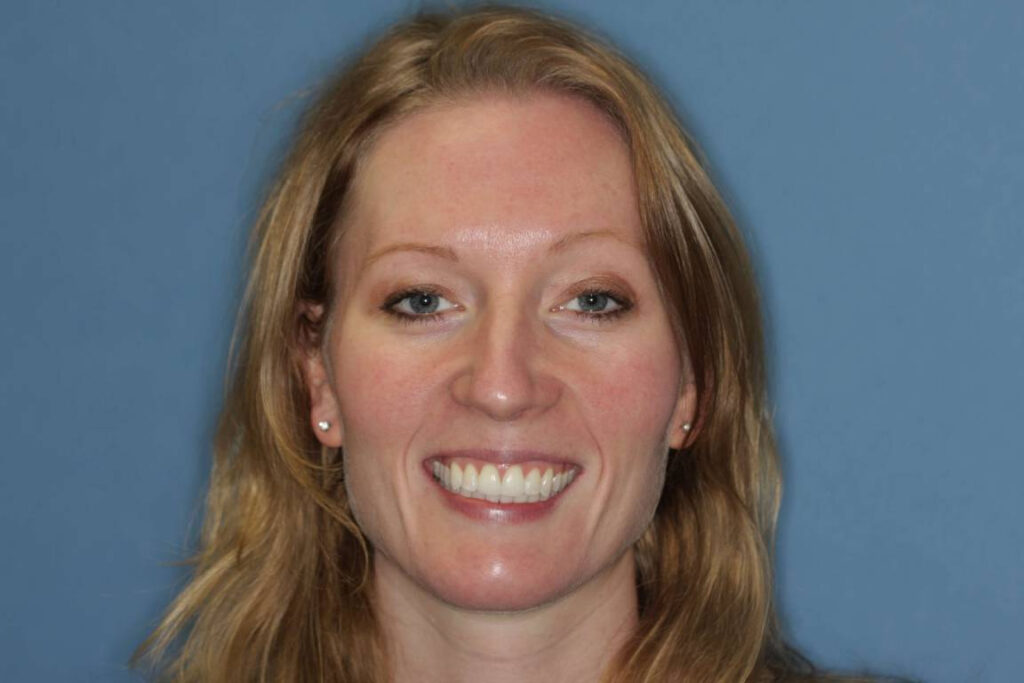Full Arch Dental Implant FAQs
Monday: 7:30am – 5:00pm
Tuesday: 7:30am – 5:00pm
Wednesday: 7:30am – 5:00pm
Thursday: 7:30am – 5:00pm
Friday: Closed
If you’re missing all of your teeth, full arch dental implants can replace your teeth, some of their roots, and restore your smile.
Full-arch dental implants are long-lasting and durable. With proper follow-up care, they often last for decades or the rest of your lifetime! This makes them a high-value investment for the right candidate. As you age, your oral health and quality of life may depend on your ability to chew and smile confidently.
They are dental implants that replace a full dental arch. This typically means replacing all of a dental patient’s top or bottom teeth. A simplistic definition is that they are metal posts that replace the root portion of missing teeth. They are surgically inserted in the jawbone with an artificial tooth (or crown) placed on an extension of the post.
Full-arch implants typically consist of a set of about 4-6 dental implants. These may be fitted in one arch or both arches of your mouth, depending on if one row of teeth or both rows need replacing.
Several factors determine the type of prosthesis used to replace multiple teeth. It includes the patient’s remaining amount of jawbone, the amount of inter-occlusal space, and the patient’s wishes.
Types of full arch dental implants:
- Fixed
- Removable
The decision-making process for determining what type of implant-supported prosthesis is preferable has many variables that must be considered when treatment planning for maximum benefit for the patient. Thoughtful assessment of patients’ options, expectations and desires before treatment is critical for a successful outcome. The longer your teeth are missing, the less jawbone may be available to receive the intended dental arch. Bone loss is a normal process where your body actually can resorb and remodel the remaining bone where your teeth have been removed. So, which ever type is best for you, it’s best to make a plan and avoid additional losses.
Placing full mouth implants involves three basic components:
- The implants, which look like screws or cylinders and are placed into your jaw.
- The prosthetic (artificial) teeth, which look and function like healthy, natural teeth.
- The abutments that are inserted into the implants and allow the new teeth to infuse with the implants.
Much like traditional implants, a titanium or zirconia implant is surgically placed into the jawbone in order to integrate and serve as a functioning root for an artificial tooth. Surrounding gum tissue will be trimmed, shaped and positioned along the jawline and around the implant healing cap. Sutures may be used to secure the gum tissue in place and be removed in seven to ten days.
Full-arch dental implants are also called “full mouth dental implants,” “fixed full-arch dental implants,” “complete arch fixed partial dentures,” or “implant-supported full arch prostheses.” They are a type of oral restoration that others may reference as implant-supported dentures. Additionally, depending on the number of implant posts required to support a full set of teeth, the “fixed” version is also known as All-on-Four or All-on-Six implants. The skill level of your implant dentist is more important than which term is used.
While different terms are used, the goal is the same.
Multiple or a full arch of missing teeth can be replaced so that you avoid unsightly, embarrassing moments, and enable you to chew and speak normally. Dr. Marc Montgomery provides patients with a safe, long-term, cost-effective, and healthy solution to multiple missing teeth with advanced full arch dental implants.
During the two to six months after full arch surgery, the implants and the bone bond together, forming anchors for the new teeth. Your Woodbury, MN dental implant specialist will determine when it’s best to remove the temporary healing caps (or the temporary teeth) and attach the abutments. Following this, your gums will need sufficient time to heal. Typically, a couple of weeks is required following this procedure; however, it depends on the individual’s overall health and ability to heal quickly.
The more dental issues a patient has prior to surgery, the more time may be need to heal.
Possible pre- and post-surgery factors that may prolong recovery:
- Unhealthy eating choices.
- Any form of tobacco use.
- Poor daily oral hygiene.
- Getting an insufficient amount of quality sleep.
- Inability to follow your dentist’s instructions.
- Other underlying health issues.
Yes. They can be a permanent solution. The intent of the treatment plan is to provide “permanent tooth replacements.” However, this requires full osseointegration of the surface molecules of an implant (titanium or ceramic) with your jawbone.
Correct diagnosis and accurate implant planning by your dentist are key for success in implant rehabilitation. Accurate impressions, the material and procedure uses, as well as meticulous attention to detail provide a foundation for successful implant prosthodontics. A comprehensive understanding of the range of prosthetic components and procedural options is essential and often gained only by a dentist with proven clinical experience.
Full-mouth dental implants offer you multiple advantages over other teeth replacement options like conventional dentures. In addition to looking and functioning like natural teeth, you gain more benefits.
Primary advantages of full arch dental implants:
- Ability to promote improved oral health. The National Institute of Health (NIH) 2022 Oct 13 Immediate Functional Loading with Full-Arch Fixed Implant-Retained Rehabilitation in Periodontal Patients: Clinical Study determined that fixed rehabilitation by immediate functional loading of implants is considered a predictable procedure. Author Eugenio Velasco-Ortega found that even in compromised periodontal patients, implant and prosthetic clinical findings are: “No implants were lost during the clinical follow-up. The cumulative survival rate for all implants was 100%.
- Chew and bite more foods than with conventional dentures. Studies show that dental patients consistently report that they are more comfortable and stable than conventional dentures. Dental implant-supported full arch prosthesis patients say that they can bite and chew naturally and enjoy menu items like before.
- Prevents existing teeth from shifting out of place. If you’ve ever had braces or Invisalign to straighten your teeth, this is more important. The prosthesis permanently locks onto each one of your implants, preventing your restoration from shifting. They can also anchor overdentures securely in place and create an immovable stable tooth restoration.
- Improved long-term implant results. They are designed to be longer lasting. Modern dental implant technology means less risk of a dental implant coming loose.
- Less time-consuming maintenance associated with conventional dentures. In the past, people needed to remove and clean their dentures after eating and then soak them overnight. Full arch dental implants only involve the same daily brushing and flossing routines that are recommended for natural teeth.
- Better integration with your jawbone. Since full-mouth dental implants replace some tooth roots, your jaw bone will be better preserved. Jaw bone that previously surrounded tooth roots With conventional dentures commonly deteriorates over time. This will lead to a recession of the jawbone and a collapsed, unattractive smile. In contrast, full-mouth dental implants do better at helping keep the bone healthy and your natural smile intact.
- More options in complex oral health cases. Implant-supported prostheses offer solution options for restoring difficult edentulous situations, which is sometimes impossible via conventional prostheses. One example may be when the inter-arch space is too much to be restored.
Many patient are pleasantly surprised that they experience very little discomfort following full arch treatment. Given the extensive nature of this treatment, Montgomery Dental Care takes a variety of additional precautions to ensure your comfort throughout the wound healing process.
Careful follow-up is always warranted to resolve possible associated problems. if your daily oral hygine is excellent, you reduce possible risks of infection and related pain levels.
Many people who consider implants to replace a row of teeth have removable, conventional dentures for lower and upper jaws. Some still have removable bridges. With a full arch dental solution, these people experience notable improvements in their ability to chew food comfortably after their dental implant treatment. Most patients report that while there is some minor and temporary discomfort involved, the results are worth it.
Yes. They can be a permanent solution. The intent of the treatment plan is to provide “permanent tooth replacements.” However, this requires full osseointegration of the surface molecules of an implant (titanium or ceramic) with your jawbone.
Correct diagnosis and accurate implant planning by your dentist are key for success in implant rehabilitation. Accurate impressions, the material and procedure uses, as well as meticulous attention to detail provide a foundation for successful implant prosthodontics. A comprehensive understanding of the range of prosthetic components and procedural options is essential and often gained only by a dentist with proven clinical experience.
Replacing a full row of missing teeth requires much more than just technical data and material costs. Multiple factors weigh into the final cost of a full arch tooth replacement. If and how extensive tooth extraction and bone shaping are needed influences cost. What may seem initially like a large sum is likely considerably less expensive than individually reconstructing and replacing each tooth.
Implant-supported restorations allow for the same level of aesthetics and durability at a fraction of the cost.
Full arch dental implant costs in Minnesota often vary significantly. If you assess it by an individual tooth, it may be as low as $5k per arch or as much as $25k per arch.
Advanced techniques may avoid the need for a bone graft. Commonly, bone grafts are necessary for patients lacking sufficient bone density to support implants fully. Angled placement may simplify the implant procedure and reduce costs by eliminating the need for bone grafts of the jaw bone.
Your initial consultation about costs will cover what services may potentially be added to your full-mouth dental implant procedure. To avoid surprise fees, we discuss the cost of appointments, additional scans, repairs, customizations, and pending additional procedures that may be recommended. A dental office that can provide all your treatment in one location can reduce costs.
After all, it is a life-changing dental treatment.
Fixed implant-supported prostheses often need five to nine implants in the mandible and six to 10 implants in the maxilla. With implant-supported dentures, a minimal number of implants can provide support for up to 16 teeth in a single arch. Typically, full arch reconstruction of edentulous ridges requires five to 10 dental implants, according to the NIH Number of implants placed for complete-arch fixed prostheses article.
Less support is provided to counteract occlusal loading when only four implants support a full arch fixed prosthesis.
When a complete row of teeth needs replacing with an implant-supported full arch prosthesis, it typically involves anywhere from two to six dental implants to anchor the restoration in place. Among numerous factors, the precise number of implants will depend on jawbone density, which full arch tooth replacement technique is used, and which row of teeth is being replaced—upper or lower.
For example, a patient with a history of aggressive periodontitis may need a full mouth rehabilitation. At times, an accident, disease, or other cause of lost teeth may mean that the remaining teeth need to be removed due to excessive mobility.
The Multi-unit abutment is crafted to accommodate both edentulous (toothless) and partially edentulous arches. Multi-unit abutments help correct varying implant heights to establish a level restorative platform for the prosthesis. This abutment also aids in situating the arch implant connection even with or just below your gingival surface.
Following tooth extraction, your healing wound partly fills in the oral space formerly occupied by your natural tooth or teeth. Eventually, the healing wound will be replaced by a “ridge” or scar tissue, which becomes part of the edentulous arch. Every individual has unique inter-arch spatial relationships that are considered for the positioning of artificial teeth, for optional ridge augmentation procedures, and for the insertion of complete arch dental implants.
Balanced adjustments of the loading improve the functioning of a mandibular full-arch rehabilitation. Careful consideration of mandibular flexure, implant evenness, and stress build-up in mandibular full-arch fixed prosthesis can improve the stability and retention of the whole prosthesis.
What To Expect During Your Full Dental Arch Consultation & Procedure
Our dental professional office in Woodbury, MN, treats patients in a comprehensive, cutting-edge office with high-quality materials, giving them their best smile ever. Dr. Montgomery gives each patient an individual consultation and evaluation of their teeth and jaw, creating a customized prosthetic plan.
Expect a comprehensive dental exam that includes assessing the condition of your teeth, including any bone loss, taking X-rays and 3D images, and making digital models of your teeth and jaw. Next, full-mouth dental implants, typically 4-8 implants, will be inserted in the ideal positions for optimal support. Finally, your customized, high-quality, permanent full arch solution can be placed, restoring your smile. Feel free to ask any questions so that you know exactly what to expect before embarking on this procedure.
Marc L. Montgomery DDS will ask you to return for re-evaluation appointments as needed. This allots for any needed adjustments to your bite, ensures that you are performing optimal oral hygiene, and are enjoying your new teeth.
Many dentists spend most of their hours performing general dentistry while occasionally inserting a dental implant. In contrast, Dr. Montgomery has vast experience with placing a large number of implants, as he is regarded as one of the best among his peers.
A skilled dentist understands the multiple factors that determine dental implant success. By keeping the angle of tooth contact shallow, paying attention to tooth support structures, and much more, Dr. Montgomery reduces stress on the multi-implant system.
Experience the Life-Changing Benefits of Full-Arch Dental Implants
Are you ready to take the next step in your oral health and invest in the permanent replacement option for your missing teeth? Once you’ve decided to make this investment in your smile and oral health, you’ll likely be eager to begin the process. After all, a healthy new smile is transformative.
To learn more about a permanent full arch tooth replacement or replacing an entire row of upper and/or lower teeth, call 651-738-1880.
Look Flawless and Radiant Anywhere You Go!



